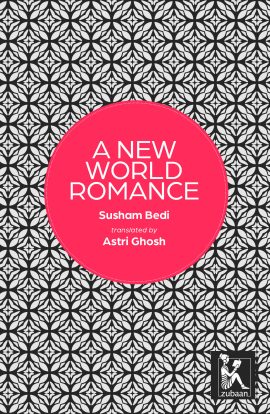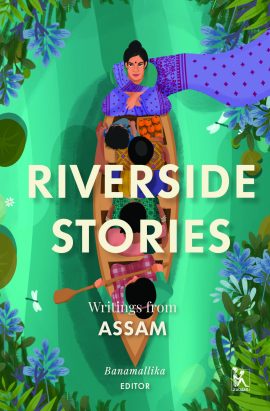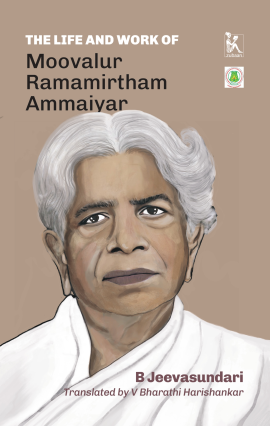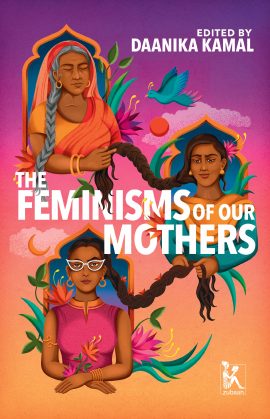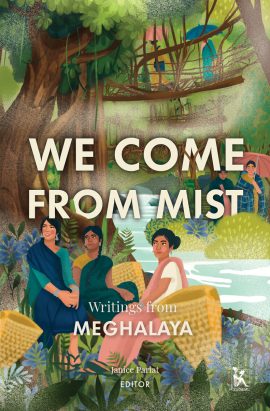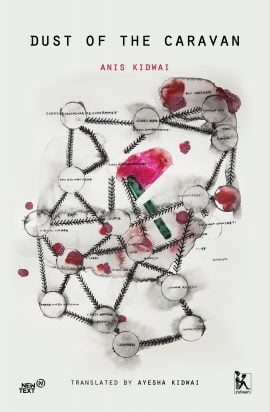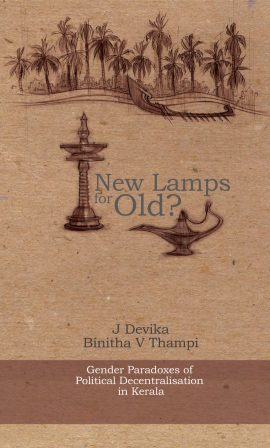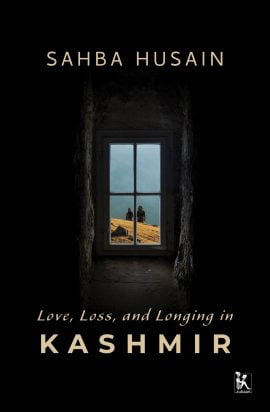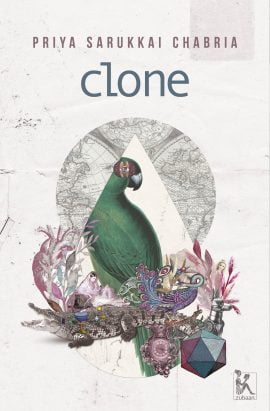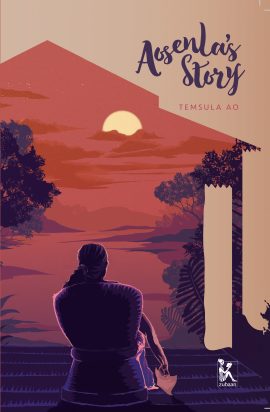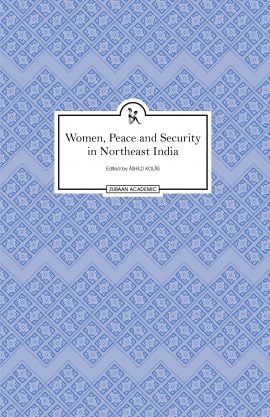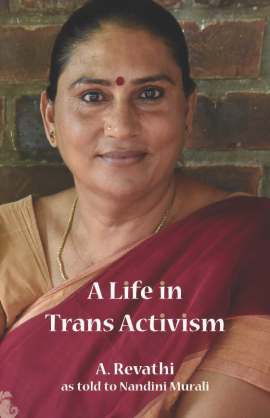No products in the cart.
Return To Shop
Log in / Sign in
Login
Register
A New World Romance
From ₹ 420An accidental meeting at a seminar brings Ketaki and Aditya, two academics based in the United States, together. Well established in their careers, with romantic and marital relationships behind them, they are located in different cities in what the author calls the ‘new world’ or Navabhum, while the ‘old world’ or Purabhum has long been left behind. Neither is in search of a relationship, but they find themselves falling deeply and inexorably in love. Even as the new world opens up infinite possibilities, the old world casts its gentle shadow over their lives and touches everything. Where, the author asks, will their love take them? Susham Bedi’s moving and delicately crafted novel is brought to us in this sensitive and nuanced translation by Astri Ghosh.
______________________________________________________________________________________Susham Bedi has left an indelible mark on Hindi literature with her nine novels, numerous short story collections, and poetry. Her writings, which often delve into the lives of Indian diaspora communities, have been translated into English, Urdu, French, and Dutch. She was honoured with prestigious awards from the Uttar Pradesh Hindi Sansthan (2007) and the Sahitya Academy in Delhi (2006). She also shared her knowledge and passion for Hindi language and literature as a teacher at Columbia University. Her academic journey, which began at Delhi University and culminated in a PhD from Punjab University, focused on Hindi language drama. She also served as the Editor of Vishvā, a quarterly journal published by the International Hindi Association.
Astri Ghosh is a translator, writer, actor and teacher. Growing up in New Delhi with a Norwegian mother and an Indian father, Ghosh developed a deep understanding of both Indian and Norwegian cultures from an early age. This has enabled her to effectively bridge cultural gaps in her translations. She translates into Hindi, English, and Norwegian. She has translated works by Jon Fosse, Henrik Ibsen, Qurratulain Hyder, Rabindranath Tagore, Guru Nanak, Lars Saabye Christensen, and Per Petterson. Astri has also translated a collection of hymns from Sikh scriptures to Norwegian in Sanger fra Adi Granth. She has acted in two films.
Books, Books from the North East, Books from the North East, e-Books, New Releases, New Releases, Non-Fiction, Non-Fiction
Riverside Stories: Writings from Assam
Rated 5.00 out of 5
From ₹ 480Stories abound in Assam’s fields, ponds, rivers, forests, hills and cities. Most of its people wear each other’s clothes, eat each other’s food and speak each other’s languages. Diversity and amalgamation are the primarily identifiable elements of people from Assam. Yet, everyday patriarchy and politics of boundaries have resulted in so much confusion and conflict. Thankfully, we are witnessing emerging voices of people who experience life differently because of their own identities and locations and propose an inclusive space for us all. The women and transpeople who have contributed to Riverside Stories come from this diversity and bring their stories of multiple experiences from Assam to the world. This collection of fiction, non-fiction, poetry and visual stories, puts on record the experiences of the self, the very personal, within homes, in the environment, with politics, and with disappointments, desires, hopes and memories for a future. In putting together this anthology, it is our hope that we have complicated—more than it already is—the notion of whose and which stories can be told.
______________________________________________________________________________________BANAMALLIKA is mostly a disheartened feminist activist from Assam. She has used storytelling as a tool for questioning power in her personal life and professional work. To her ever-expanding array of activities, she has added drawing, filmmaking, entrepreneurship, gardening, theatre, cooking, research, writing and, very recently, playing with clay. She draws her sustenance from the feminist movement and its solidarity. She is currently fantasising about not having to write another proposal or project report and living on a farm on a foothill by a spring.
The Life and Work of Moovalur Ramamirtham Ammaiyar
From ₹ 345
Moovalur Ramamirtham Ammaiyar spent almost her entire life fighting against the devadasi system in Tamil Nadu, a practice that dedicated young girls to temples, where they were meant to be available for the sexual needs of priests and landowners. Sold off by her parents, and brought up to dedicate herself as a dasi, she managed to escape this fate and make a life for herself. Her battle against the devadasi system was met with considerable resistance, not only by those with vested interests in keeping the devadasis inside temples, but often by the devadasis themselves. But Moovalur persisted, taking her cause, and its wider ramifications into the broader politics of the Congress party, and later the Self-Respect Movement. Despite this, in the annals of recent Tamil history, she was hardly known, until the publication, in 2006 of Moovalur Ramamirtham: Vazhvum Paniyum (translated here as The Life and Work of Moovalur Ramamirtham Ammaiyar). Put together through interviews with her surviving relatives and fragments garnered from a handwritten manuscript, this is the first book to document the ‘braveheart’ of Dravidian history, Moovalur Ramamirtham Ammaiyar.
Select format
This product has multiple variants. The options may be chosen on the product page B JEEVASUNDARI is a feminist researcher, writer and media person. She has contributed to various Tamil magazines including Pikika Children’s Magazine, Police News, Puthiya Paarvai, Araam Thinai, Kumudham Snegithi and Penne Nee. Moovalur Ramamirtham: Vazhvum Paniyum (The Life and Work of Moovalur Ramamirtham Ammaiyar) is the result of her independent research. She has also edited a book entitled, Thaneer – Santhaikalla Makkalukke. Her articles on women’s independence and violence against women have been compiled into volumes entitled, Penn enum Pagadaikkai and Kurallatra Bommaigal. Her abiding interest in movies has resulted in a set of serialised essays, ‘Raisgai Paarvai’ which have been published in the film critics magazine called Kaatchi Pizhai. The collection was later published as a book and received an award for the best feminist book. She has also received the Chinna Kuthoosi Award for her essays, and has translated many children’s books into Tamil.
V BHARATHI HARISHANKAR is vice chancellor of Avinashilingam Institute for Home Science and Higher Education for Women. Previously, she was the founding Head of the Department of Women’s Studies, University of Madras. Her research interests include postcolonial literatures, literary theory, translation studies and web-based pedagogies. She has taught courses, guided research, and has written over 120 publications including research articles, books, edited volumes and textbooks in all these areas. She has co-authored three books on teaching translation. Her notable translations include Shanmugasundaram’s Nagammal and Thamizachi Thangapandian’s Birthing Hut and Other Stories. Her interest in Moovalur Ramamirtham Ammaiyar stems from the project on devadasis that she has worked on for the National Commission for Women.The Feminisms of Our Mothers
From ₹ 420‘Some of our mothers marched the streets in the 1980s, demanding the emancipation of women. Three decades later, they accompanied their daughters to Aurat March, reflecting on past formations, present collectives and feminist futures. Some made concessions in their acceptance of traditional gender roles, forming conflictual relationships with daughters that pushed the boundaries of propriety. Some may not refer to themselves as feminist, differing from their daughters about the significance and implications of labels. Yet, the subtleties of our mothers’ adaptabilities are centred on women’s empowerment. Situated amongst these subtleties are moments of consciousness and self-determination that we, as daughters, navigate through, as we limn the contours of our own feminist formations.’
In this remarkable collection of essays about their mothers, women from Pakistan explore the many meanings of feminism and its varying interpretations through generations. How, they ask, do these meanings change, mould, attract and detract within and between generations? How do women bridge the cracks that emerge in these formations as they hold within them the joys, sorrows, conflicts and contradictions of their multiple feminisms?
DAANIKA KAMAL is a researcher and writer from Karachi. She has worked across the development, legal and academic sectors, with a focus on gender-based violence, access to justice and rights protections of women and girls. She is currently based in London, where she is completing a PhD in Law. Daanika is an internationally published author and editor in the fields of gender empowerment, climate change, law, and mental health. The Feminisms of Our Mothers is her first anthological project.
Books, Books from the North East, Books from the North East, e-Books, Fiction, Fiction, New Releases, New Releases
We Come From Mist: Writings from Meghalaya
From ₹ 395
This book is an offering—of prose, poetry, musical lyrics, and visual art—by the women of Meghalaya in Northeast India. One of the smallest states in the country, but also, one of the most beautiful, Meghalaya is blessed with landscapes that mesmerize and inspire song and story. In the not-so-distant past, though, it has also seen political turbulence and civil unrest, and many of the works here capture that quiet unease—in homes and kitchens, in market-places and public taxis. Yet this anthology is also a celebration. Of wisdom and joy, of queerness and sisterhood, of mothers and feminine bodies, of home and hearths. Of voices new and established. Brought together in one volume by Janice Pariat, a novelist and poet from these hills. Here, we sit together around a fire, and sing, and weep, and dance, and tell stories. We dream of where we came from, the hills, the mist, and dream of what else we are still yet to discover.
Contributors: Amanda Basaiamoit | Amanda Christie Tongper | Amrita Dutta | Angel Konthoujam | Anjum Hasan | Antara Roy Oruganti | Balaiamon Kharngapkynta | Bymonmiralda B Lato | Careen Joplin Langstieh | Cheryl Rynjah | Clarissa Giri | Daiaphi Lamare aka Reble | Daiarisa Rumnong | Daribha Lyndem | Esther Larisa David | Evangelene Nongkhlaw | Fileona Dkhar | Jobeth Ann Warjri | Karen L. Donoghue | Lahundashisha Kharshiing | Longnam Wanbiang Kharpuri | Maya Mawlong | Menty Jamir | Reeju Ray | Samanda Nora Pyngrope | Satarupa Paul | Saweini Laloo
JANICE PARIAT is the author of Boats on Land: A Collection of Short Stories and Seahorse: A Novel. She was awarded the Sahitya Akademi’s Young Writer Award and the Crossword Book Award for Fiction in 2013. Her novella The Nine Chambered-Heart, bestselling in India, was published in the UK and in ten other languages including Italian, Spanish, French, and German. Her most recent work Everything the Light Touches has been widely acclaimed. She lives between Shillong and New Delhi with a cat of many names.
Select format
This product has multiple variants. The options may be chosen on the product page Contributors: Amanda Basaiamoit | Amanda Christie Tongper | Amrita Dutta | Angel Konthoujam | Anjum Hasan | Antara Roy Oruganti | Balaiamon Kharngapkynta | Bymonmiralda B Lato | Careen Joplin Langstieh | Cheryl Rynjah | Clarissa Giri | Daiaphi Lamare aka Reble | Daiarisa Rumnong | Daribha Lyndem | Esther Larisa David | Evangelene Nongkhlaw | Fileona Dkhar | Jobeth Ann Warjri | Karen L. Donoghue | Lahundashisha Kharshiing | Longnam Wanbiang Kharpuri | Maya Mawlong | Menty Jamir | Reeju Ray | Samanda Nora Pyngrope | Satarupa Paul | Saweini Laloo
JANICE PARIAT is the author of Boats on Land: A Collection of Short Stories and Seahorse: A Novel. She was awarded the Sahitya Akademi’s Young Writer Award and the Crossword Book Award for Fiction in 2013. Her novella The Nine Chambered-Heart, bestselling in India, was published in the UK and in ten other languages including Italian, Spanish, French, and German. Her most recent work Everything the Light Touches has been widely acclaimed. She lives between Shillong and New Delhi with a cat of many names.
Dust of the Caravan
From ₹ 420
Dust of the Caravan is a selection of writings by Anis Kidwai sketching the personal and political journey of a Muslim woman through the first eight decades of the 20th century. In Kidwai’s often humorous and always incisive and compassionate telling of the travels that took her from a birth and upbringing in rural Awadh into the maelstrom of Partition and its aftermath, lies a rich tapestry of tales.Simultaneously a social history of life in rural Awadh in the early 20th century and the birth of the national movement in the region as well as an account of the traditions of mutual respect and understanding between different faiths in a shared culture and the rupture of those very traditions during Partition, this book is also the story of a woman’s journey from the home into the world and from ‘family values’ towards autonomous beliefs, friendships, and activism. In addition to its value as a literary work, Dust of the Caravan is an important resource in the fields of history, sociology, and gender studies.
Born in 1906 in Barabanki, ANIS KIDWAI was a member of the Rajya Sabha (1956-68) and a social activist, committed to secularism and the rights of minorities and women. Kidwai had a six-decade long literary career as an essayist, and is perhaps best known for her two collections of essays—Nazre Khush Guzre (1975) and Ab Jin ke Dekhne Ko (1978), as well as her sombre Urdu memoir of Delhi during Partition, Āzādi Ki Chhaon Mein. A prolific contributor to Urdu women’s journals and literary periodicals, Anis Kidwai perfected a highly individual style in which wit and sarcasm combined with perspicacious observation, literary allusion, and a progressive politics. In 1981, she was awarded the Sahitya Kala Parishad Award. She passed away on 16 July 1982.AYESHA KIDWAI teaches linguistics at Jawaharlal Nehru University and is Anis Kidwai’s granddaughter. She is also the translator of Āzādi Ki Chhaon Mein, which appeared as In Freedom’s Shade in 2011.
Select format
This product has multiple variants. The options may be chosen on the product page “An archivist’s delight, an emotional roller coaster, a challenge to settled opinions, a must read for everyone with a conscience who is thinking about the soul of India.“ — Uma Chakravarti, Historian
“Written in scintillating prose, rich in anecdotes, candid portraits, and everyday details, they open up for us the world at once intimate and expanding of the zenana..” — Francesca Orsini, SOAS University of London
“Ayesha Kidwai’s sensitive translation of her grandmother’s writing captures its multiple registers and unique expression to reveal a woman’s voice at once poignant, funny, piercing and poetic.” —Siobhan Lambert-Hurley, University of Sheffield
“Dust of the Caravan is a compelling story of knitting dreams of a just and equal India, a story of a struggle propelled only by hope, a story which, but for Ayesha Kidwai, would have remained inaccessible to a wider audience.” — Saif Mahmood, Writer, Translator, Lawyer
Born in 1906 in Barabanki, ANIS KIDWAI was a member of the Rajya Sabha (1956-68) and a social activist, committed to secularism and the rights of minorities and women. Kidwai had a six-decade long literary career as an essayist, and is perhaps best known for her two collections of essays—Nazre Khush Guzre (1975) and Ab Jin ke Dekhne Ko (1978), as well as her sombre Urdu memoir of Delhi during Partition, Āzādi Ki Chhaon Mein. A prolific contributor to Urdu women’s journals and literary periodicals, Anis Kidwai perfected a highly individual style in which wit and sarcasm combined with perspicacious observation, literary allusion, and a progressive politics. In 1981, she was awarded the Sahitya Kala Parishad Award. She passed away on 16 July 1982.AYESHA KIDWAI teaches linguistics at Jawaharlal Nehru University and is Anis Kidwai’s granddaughter. She is also the translator of Āzādi Ki Chhaon Mein, which appeared as In Freedom’s Shade in 2011.
New Lamps for Old?: Gender Paradoxes of Political Decentralisation in Kerala
From ₹ 475
Based on a large number of interviews with women politicians of many generations and women who have entered the three-tier Panchayati Raj institutions since the mid-1990s in Kerala, this book tries to initiate fresh debate on the impact of the large-scale induction of women into the institutions of local self-government in India. The State of Kerala has been hailed as a success story in accommodating gender concerns in local-level planning and political decentralisation; this conclusion has been based on relatively simple evaluative exercises that ask whether women of diverse backgrounds have gained entry into formal institutions of governance or not.This book seeks to place political decentralisation and its possibilities for women within the historical and contemporary contexts. Against the popular assumption that the liberal feminist promise made by the state will be delivered, say, once the noxious influence of male relatives is removed, the book points to the multiple social forces that shape possibilities and hindrances for women, and reshape gender divisions in the political field. The book thus pays attention to women in both local governance and politics. Secondly, it examines how women have utilised, extended, survived within or subverted these spaces. In the present context in which fifty per cent of the seats in the institutions of local self-government are being reserved for women, and there exists considerable skepticism about reservations for women in the Parliament, this book offers reflections on both local governance and ‘high’ politics.
Select format
This product has multiple variants. The options may be chosen on the product page Love, Loss, and Longing in Kashmir
From ₹ 298
In this personal and passionate account, activist and researcher Sahba Husain documents her deeply engaged and empathetic involvement with the politicised terrain of Kashmir. As she meets people that she speaks with and, more importantly, listens to, she begins to question her own ‘Indian’ identity. Recognizing the anger, despair and helplessness of a people caught in conflict and violence, Husain forms deep friendships during her time working in the state.It is these relationships that form the backdrop of this book, in which Husain focuses on certain key areas: the health of a people, militancy and its changing meanings for local people and the state, impunity and the search for justice, migration and the longing for homes left behind, and women’s activism in the faultlines of nation-state and community. A book of surprising beauty in its engagement with human relationships, of love for a land and a people and of hope for a future free of violence, Love, Loss, and Longing in Kashmir is a compelling and necessary read.PUBLISHER'S NOTE: As this book goes to press, there is news of the abrogation, by the Indian government, of Article 370 of the Indian Constitution that grants special status to the state of Jammu and Kashmir. Major changes that affect the lives of people in Kashmir are being put in place. Currently, there is a heavy presence of the armed forces, curfew is in place, telephone and internet lines have been suspended, people are in fear and there is huge bewilderment, confusion, anger. No one knows what the future will hold. This book, the result of long years of engagement with Kashmir, ends on a note of hope. It is our hope and belief too that whatever the future holds, it is the people of Kashmir who will shape it for their state and their world.
SAHBA HUSAIN is an independent researcher and women’s rights activist. For the last two decades, she has travelled extensively in Jammu and Kashmir, documenting the social consequences of armed conflict, mass violence and militarization on individuals, families and communities, with a special focus on women. Her earlier research focused on problems of working women in the organized and unorganized sectors in several states of India and on the impact of development policies on women’s social, political and economic status.
Select format
This product has multiple variants. The options may be chosen on the product page SAHBA HUSAIN is an independent researcher and women’s rights activist. For the last two decades, she has travelled extensively in Jammu and Kashmir, documenting the social consequences of armed conflict, mass violence and militarization on individuals, families and communities, with a special focus on women. Her earlier research focused on problems of working women in the organized and unorganized sectors in several states of India and on the impact of development policies on women’s social, political and economic status.
Clone
From ₹ 298
A revolutionary take on the classic dystopian science fiction novel, Clone inaugurates a new kind of writing in India. Priya Sarukkai Chabria weaves the tale of a fourteenth-generation clone in twenty-fourth-century India who struggles against imposed amnesia and sexual taboos in a species-depleted world. With resonant and allusive prose, Chabria takes us along as the clone hesitantly navigates through a world rendered unfamiliar by her expanding consciousness. This slow transformation is mirrored in the way both she and her world appear to the reader. The necessary questions Chabria raises revolve around a shared humanity, the necessity of plurality of expression, the wonder of love, and the splendour of difference.Clone’s adventurous forays into vastly different times, spaces, and consciousness—animal, human, and post-human—build a poetic story about compassion and memory in the midst of all that is grotesque.Note: A different version of this book was previously published under the title Generation 14.
Priya Sarukkai Chabria is a writer, poet and translator. She has written several books, including Dialogues and Other Poems, Not Springtime Yet, and Generation 14. She is also the co-author / co-translator of Andal: The Autobiography of a Goddess, published by Zubaan in 2016.
Select format
This product has multiple variants. The options may be chosen on the product page "Eloquent" — Sudipta Dutta, The Financial Times
"A poetic imagination" — Tim Parks, translator and author
"Ambitious and inventive" — George Szirtes, translator and poet
"Lyrically written" — Rashmi Vasudeva, Deccan Herald
Priya Sarukkai Chabria is a writer, poet and translator. She has written several books, including Dialogues and Other Poems, Not Springtime Yet, and Generation 14. She is also the co-author / co-translator of Andal: The Autobiography of a Goddess, published by Zubaan in 2016.
Aosenla’s Story
₹ 595
After the success of These Hills Called Home and Once Upon a Life, Temsula Ao returns to her beloved Nagaland to bring readers the beautifully crafted story of Aosenla, a woman who is coming to terms with herself. The novel opens on a typical summer afternoon that soon turns into another oppressive evening. Aosenla sits listening to her children playing nearby and is seized by a great lethargy. As she casts a watchful gaze over the house she has called home for so many years, Aosenla wonders how an inanimate structure like a house can exercise such power over a human being.Looking down at a wedding invitation in her hands, Aosenla begins to recall her own wedding many years ago, initiating a deep and moving reflection on the life that others made for her and the life that she eventually created for herself.
Add to cart
Women, Peace and Security in Northeast India
From ₹ 298The states in the northeast of India have been subject to multiple protracted conflicts. In the cases where the gendered nature of these conflicts is considered, stereotypes of women as passive victims or natural peacemakers tend to be reproduced, and scholars follow the establishment’s cues in employing analyses from a conventional security studies perspective, focusing on ceasefires and surrender packages for militants, male-dominated negotiations over autonomy and statehood, and ‘homeland’ politics. Even as women have become increasingly vocal in civil society attempts to resolve conflict and build peace in the region, their voices and work are ignored. The media has turned its spotlight on activists like the Meira Paibis and Irom Sharmila, but has yet to acknowledge the significance of women’s everyday resistance, activism and agency – and this lack of attention is a further aspect of their marginalization.
This volume sheds light on the successes and failures of the women’s movements in and of the region; women’s responses and engagements with conflict and peace-building; as well as their challenges, aspirations and experiences as agents of change. It adds important insights into the debate on gender and political change in societies affected by conflict. Moreover, by engaging critically with the ‘women, peace and security’ literature, the volume takes a fresh look at ‘universalist’ feminist and interventionist biases, questioning the notion that peace processes should be treated as windows of opportunity for women’s empowerment and positing that it is crucial to understand gender relations during conflict as historically contingent, complex and multifaceted, and intertwined in the social fabric.
Books, e-Books, Feminism In India Recommends, Feminism In India Recommends, Non-Fiction, Non-Fiction
A Life in Trans Activism
From ₹ 340
When Revathi’s powerful memoir, The Truth About Me, first appeared in 2011, it caused a sensation. Readers learned of Revathi’s childhood unease with her male body; her escape from her birth family to a house of hijras (the South Asian generic term for transgender people), and her eventual transition to being the woman she always she knew was. This new book charts her remarkable journey from relative obscurity to becoming India’s leading spokesperson for transgender rights and an inspiration to thousands.Revathi describes her life, her work in the NGO Sangama, which works with people across a spectrum of gender identities and sexual orientations, and how she rose from office assistant to director in the organization. Today she is an independent activist, theatre person, actor and writer, and works for the rights of transgender persons.In the second part of the book, Revathi offers the reader insight into one of the least talked about experiences on the gender trajectory, that of being trans men. Calling several female-to-male trans persons her sons, Revathi puts before us their moving, passionate and sometimes tragic stories of marginalisation, courage, resistance and triumph.An unforgettable book, A Life in Trans Activism will leave the reader questioning the ‘safe’ and ‘comfortable’ binaries of male/female that so many of us take for granted.
Select format
This product has multiple variants. The options may be chosen on the product page Contact Us
© Zubaan 2019. Site Design by Avinash Kuduvalli.
Payments on this site are handled by CCAvenue.

